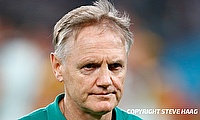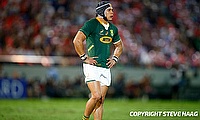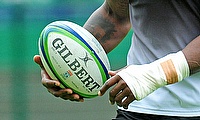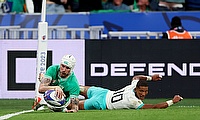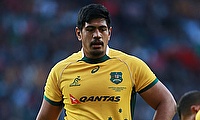Just For Fun: Al Baxter On A Life in the Front Row
Part One “ Best of the Rest, The Wallabies and 'That Game'
When the NSW Waratahs forwards packed down for their first scrum of the 2012 Super Rugby season against the Queensland Reds, they were missing a significant amount of the intellectual property and experience they have had at their disposal in recent years.
When Al Baxter decided to hang up his boots at the end of the 2011 season, New South Wales and Australian rugby lost one of its most talented and popular figures. Finishing his career as the Wallabies' most capped prop of all time with 51 tests under his belt, the man affectionately known as 'The Fuse' could also count 121 Super Rugby caps to his name, putting him second on the all-time appearances list for NSW. He performed at two World Cups - starting in the final against England back in 2003 and scoring his one and only try in Wallaby colours in his 50th test at the 2007 tournament in France. He also reached two Super Rugby finals in 2005 and 2008 and played a large part in the Waratahs' six year reign through the 2000's as the top dogs of Australian rugby.
Often referred to as the 'smartest guy in the room' by his team mates, Al has also spent the last few years combining his professional rugby career with a part-time role in the field of architecture, for which he has a degree from the University of Sydney. The next phase of his life will see him keep in touch with his sporting roots, designing and redeveloping some of the world's great stadia as he begins to explore his architectural passions on a more permanent basis. Truly, one of the nicest guys in rugby, Al was as generous with his time as ever when I sat down with him recently to take a look back at his stellar career and at some of the people and experiences that he encountered along his rugby journey.
Ok Al, let's start with an old favourite - who were the best players you played alongside in your career?
Al Baxter: "The person who I was the most surprised at when I first played with them was Joe Roff. I always knew he was a good player but when you actually saw the stuff he did in a game, he was just so deceptive. His size and strength and speed were really deceptive and he had this long, loping running style so when you saw him on TV you didn't think he was running that fast but when you're trying to catch up to him or run anywhere near him in a game, he'd just fly past you. He was a big bloke, he would've been 6ft 3ins or 6ft 4ins and because he was so long he didn't look stocky or chunky but he was really strong as well, he'd bust tackles or glide out of them or palm people off.
Who else stands out?
AB: "I guess two freaks that I've played with are George Smith and Phil Waugh. George Smith just because he can do anything and yet, he never really trained that hard. He was just dreadful at training, when we did the beep test for fitness, he would drop out right at the start - before the fat props drop out - and then you'd play a game on the weekend which was the hardest game in terms of fitness you've ever played and he was still running a million miles an hour at the end of it. He just had no motivation for training whatsoever but as soon as you got into a game he just switched on, he was an extraordinary player.
"And Phil Waugh for another reason, he is a masochist - probably a sado-masochist actually as he likes inflicting pain! I've never seen a man take more pain and the ruptured bicep he incurred at the Tahs last year was a perfect example. He ruptured his bicep and all the surgeons were telling him it'd be twelve weeks and he asks 'Is there any other option?' and they said 'Yes, you could let the bicep die and you'll be able to get around it, your body will adapt, but you'll have no bicep' so he says 'Righto', I'll take that option'! The amount of times he played with busted ribs or other corks or serious injuries was pretty extraordinary.
If Phil was the toughest you've played with, who were the hardest players you faced?
AB: "Two come to mind and that's Brad Thorn and Martin Johnson, they're both really similar in terms of their physical presence on the field. I've lined up blindside to clean out both of them in games, hit them at full pace and they've hardly moved. You whack into them and they're just solid as a rock, they're like hitting granite and you just think 'Oh, s**t!'.
"Both of them are really good blokes after the game but on the field they are tough, hard competitors and - not through cheap shots “ but if you're there to be whacked, they're gonna whack you with all they've got. That's the way rugby should be played, you go as hard as you can but those blokes could certainly go harder than most.
Ok, let's narrow it down a bit. After a career spent putting your head in where it hurts, who are the best front rowers you've packed down against?
AB: "Os du Randt and Kees Muuws were probably the best. Os had a cool head with a massive amount of experience and a huge amount of size and strength at his disposal. He'd seen and done every front row trick in the book and had the strength and hardness of an old school high veldt farmer. Alongside Matt Dunning, he was the strongest bloke I've played against, they were both extraordinarily strong but you could get some gains in the final ten minutes of each half against them because their fitness wasn't quite where it should've been. Kees was just raw power and he made you feel like you were in a street brawl every time you packed against him.
"I still think Benn Robinson is one of the hardest guys to scrummage against. He's strong and squat and he's one of those annoying little blokes who wedges himself in there and is extraordinarily efficient. When he knows he can't get anywhere, he'll just bide his time and then when you give him just a tiny little millimetre, he'll go absolutely nuts because he'll be fresh as he hasn't wasted any energy winning a losing battle. He'd have to be right up there as well.
Who were the best coaches you have worked under and/or did you take something from each of them?
AB: "I think you take something from each of them. Michael Foley and Eddie Jones were the two most technically minded coaches I played under. I haven't seen any better than Chris Hickey in terms of being excellent at putting systems in place and also - probably more importantly - at putting the right people in the right place. He was a very good bloke and he was able to put in - not only people that were very skilled in most positions - but also people that were good blokes, that was his main strength. That created a great team environment which was very enjoyable to be in, it was very harmonious.
What about in terms of team culture?
AB: "Two for different reasons. Ewen McKenzie is brilliant in terms of his on field winning culture, he's all about winning every single little contest and doing that in training or doing that in a game, even if it's a simple little drill. I think that is really important, especially for a team that's become used to failure, like the Reds were. That really turns them around because it makes sure you get into a habit of winning.
"In terms of culture overall, I think Bob Dwyer was the best I've ever been under, he was superb. On field he was tough, he made sure training was done perfectly and you couldn't stuff up a drill, you kept doing it until it was right, so he was really strict. It was a good philosophy, if you train with mistakes, you're going to play with mistakes. If you train absolutely perfectly with perfect technique and as hard and as fast as you can do it then yes, the training is tough but you'll reap the benefits.
He was pretty good at looking after a side off the pitch as well wasn't he?
AB: "He was the best I've ever seen at switching off a side. He was all about enjoying what rugby life is all about and he had “ probably still has - the best network of rugby people around the world. You'd be in some part of Africa and he'd say 'I know a bloke who owns a winery just around the corner, why don't we go and visit that' so he'd take the team off to a winery for the day. Another time in Africa, he knew a bloke who owned a game park so we ended up hopping on a private plane and heading off to a game park for a couple of days.
"We stayed at nice places, we ate at nice restaurants - you lived the rugby life the way it was, I guess, back in amateur days. It was bloody hard when it was on but it was really enjoyable when it was off.
69 tests and 121 Super Rugby caps - can you pick out a specific game that you remember more than most?
AB: "There's been a few. Obviously, the game in 2008 at Twickenham for the Wallabies stands out for personal reasons. We'd had that horrible game in 2005 where I got blamed for the scrum performance and in 2008, we went back again seeking redemption. We'd had eighteen months under scrum coach Michael Foley and had done well in the Tri-Nations and the Bledisloe Cup in the set-piece and were quietly confident but when we arrived, we just got torn into - well, I personally was torn into by the English press.
"They said we were still muppets and not worthy of international test selection etc but then we went and dumped England in the scrum in the game which was hugely satisfying and I actually felt sorry for the English blokes after that because literally, in the eighty minutes of the game, the press went from ripping into us to then ripping into their own players. The English press is such a double-edged sword, they might be alright when you're doing well but if you're “ and England didn't play particularly badly “ but we did get over the top of them in the scrum and on top of them in the game and the press just went to town and I thought 'poor bastards'. They've got to deal with this every single day of the week, not just a couple of weeks a year when they come away on tour.
Any other matches spring to mind?
AB: "I guess the debut is always a big one so my first Waratah match and also my Wallaby debut against New Zealand in Auckland in 2003 were pretty special. Then, the World Cup final in 2003 and also my 50th game at the 2007 World Cup where I scored a try. I remember that fondly because it was just a great World Cup to be at. I think it was our third pool game against Canada in Bordeaux and we'd already had four weeks in the South of France and it was just brilliant.
Was that game back in 2005 at Twickenham the biggest disappointment of your career?
AB: "It was disappointing but I think it was also down to a lack of knowledge from the Australian journo's who perpetuated it because they weren't very knowledgeable about the technique of the scrum. Up until the 2003 World Cup, the scrum really wasn't that much of a focus for many teams. The English started a more technical approach than anyone else at that time and they were getting a few advantages and they started to reap those rewards at the World Cup. New Zealand - who pride themselves on the scrum - got shown up a couple of times during that tournament so they implemented a full time scrum coach after that and Australia didn't.
"We didn't have a scrum coach all the way up until 2005 and because of it, we were basically doing no technical scrum training. At the time, the head coach of my club side Norths, was actually a front rower and we were doing more technical stuff there than we were at the Wallabies which was ridiculous. That was the philosophy of the national union and unfortunately, it really showed itself in that game.
When was the last time you watched the game and how do you view it now “ has time healed any wounds?
AB: "I've only seen it once recently and yes, my scrummaging was poor, but so was the scrummaging of the whole eight. We were appalling and unfortunately, the Australian press - which is a little bit better now but wasn't great at the time - just jumped on the bandwagon. They didn't know what the problems were or what the issues were, they saw it as a front row issue not as a whole eight issue and yeah, I copped it.
Did that incident taint the rest of your time in national colours because it wasn't as if you never played again after that, was it?
AB: "In all honesty, it gives me the s**ts sometimes but I sit there thinking 'well, I still played from 2005 to 2009' which is four more years of test rugby. I played a lot of tests after that game and really, it's the opinion of selectors, your coaches and your team mates that matter a whole lot more than the opinion of the journo's and I think if I was concerned by what was written about me, then I would've pretty much given way a long time before that point.
"Every player gets the highs and lows. When you first turn up, everyone thinks you're brilliant and when you have your first bad game, everyone thinks you're rubbish and should be replaced by the next bloke. It's one of those things where you don't like to see bad press but it was the nature of the beast at the time.
You mentioned the 2003 World Cup Final. Obviously, you reached the pinnacle match of your sport and on home soil but fell agonizingly short of the big prize. Mixed emotions about it now I suppose?
AB: "Yeah, well that was I guess, the highs and lows all in one. To get so close and then to fall down at the last hurdle in over time was pretty destroying. We saw how the French were after eighty minutes against the All Blacks a few months back, well, we had an extra twenty minutes on top of that and couldn't get there so that was pretty tough. I think actually, a worse experience was that game in Marseille at the 2007 World Cup against the English. We'd played some really good rugby during the lead up to that game and then, when it came to that quarter final, we underestimated what the English were going to do. We thought they weren't going to close the game down as much as they did and also, we executed poorly.
"I was on the bench for that game and our set piece wasn't good, our kicking wasn't good, our passing, catching and tackling wasn't good, it was all just a mess and that was horrible. We really thought we had a pretty handy side that year with guys like Stephen Larkham and George Gregan and a few others and we were sitting there after the game shaking our heads saying 'the 2003 England team was brilliant but we just got beaten by an English side that was nothing like that'. The only consolation was when we saw that the New Zealanders had lost as well but that two hours in between our loss and theirs was pretty soul destroying.
IN PART TWO “ Highs and lows with the Waratahs, talking scrums and the future ¦
This article was previously published at www.ruggamatrix.com
Credit - Getty Images


